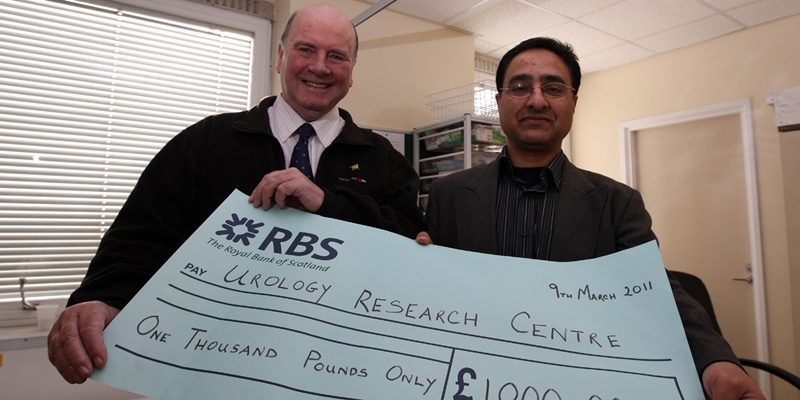A tribute to the skill and care of prostate cancer experts was delivered by an Angus councillor this week as he made a donation to support the effort to establish a new facility for those facing the disease.
In Prostate Cancer Awareness Month, retired businessman Bob Spink spoke frankly about his battle with what remains for many men a taboo subject, despite 2700 Scottish males being diagnosed with the condition annually and some 19,000 living with it.
At Ninewells Hospital, Mr Spink presented a cheque to support the fund established by consultant neurological surgeon Ghulam Nabi to create a better environment where patients can learn about their cancer diagnosis.
Mr Nabi was inspired to set up a £500,000 campaign to create a sound-proofed room where patients with prostate and other urological cancers can find information on it. He hopes this will avoid the situation many find themselves in, with questions swirling around their mind as they walk a hospital corridor minutes after a life-changing diagnosis has been delivered.
Mr Spink (72) was first diagnosed with prostate cancer just over four years ago and vividly remembers the “shock, disbelief and denial” felt by himself and close family members.
“Any serious illness among any of us affects us all. Once over the shock I resolved to be the best patient ever and put myself completely under the care of those who know best and who deal with it daily,” he said.
“Of course, I had my bad days and there were times I would lie awake at 3am feeling a bit sorry for myself, or when the daily trip to Ninewells for treatment became onerous, but never for long. I always told myself I was too busy to be ill so get on with it. It’s just an inconvenience I would say and once accepted, you can live with it.”
He added, “I thus appreciate exactly what Mr Nabi is seeking to do to address the fear and facts quickly of prostate and other urological cancers and in a better, more controlled manner.
“Early discovery of cancer is vital. Knowledge and understanding of your condition and treatment is important in the road to recovery, and hence my donation to the Urology Research Fund as a token of thanks for what was done for me.
“I would also like to give my heartfelt thanks firstly to my wife Rhona for taking me up and down to Ninewells and for being the front line if I lost the place for a bit; to Mr Byrne and the nurses of the urological ward, and Dr Windsor and her team in the radiotherapy unit at the Alexandra Centre for their caring and professional attention.
“I always felt safe in their hands, a state of mind I also believe to be of great importance in illness treatment and recovery.”
